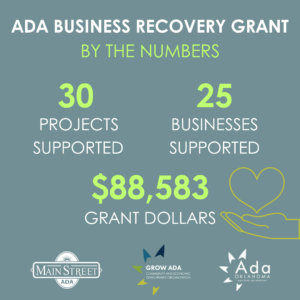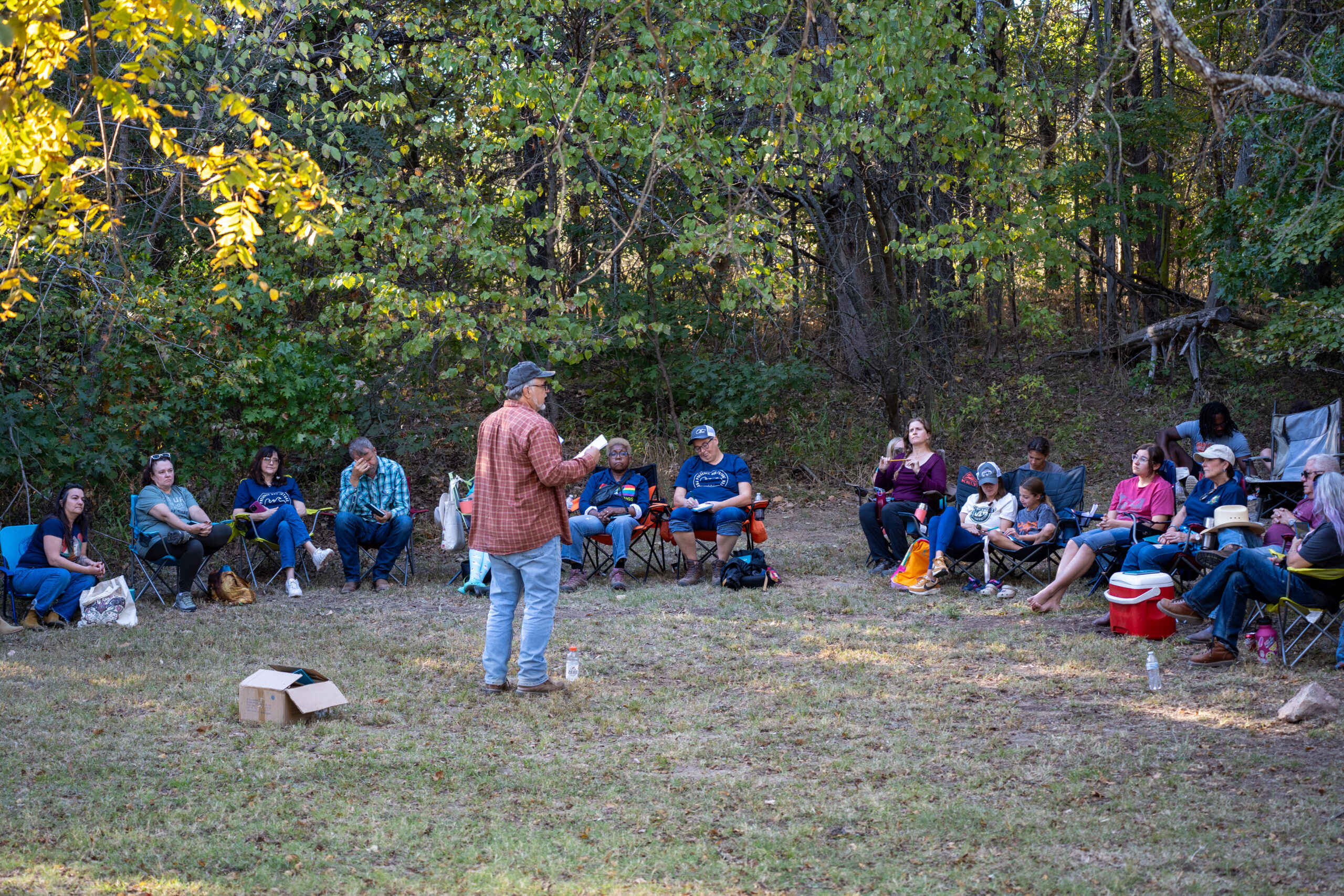
Oka Camp: A Day of Learning, Reflection, and Connection at the Blue River
October 30, 2024 by Ada Jobs
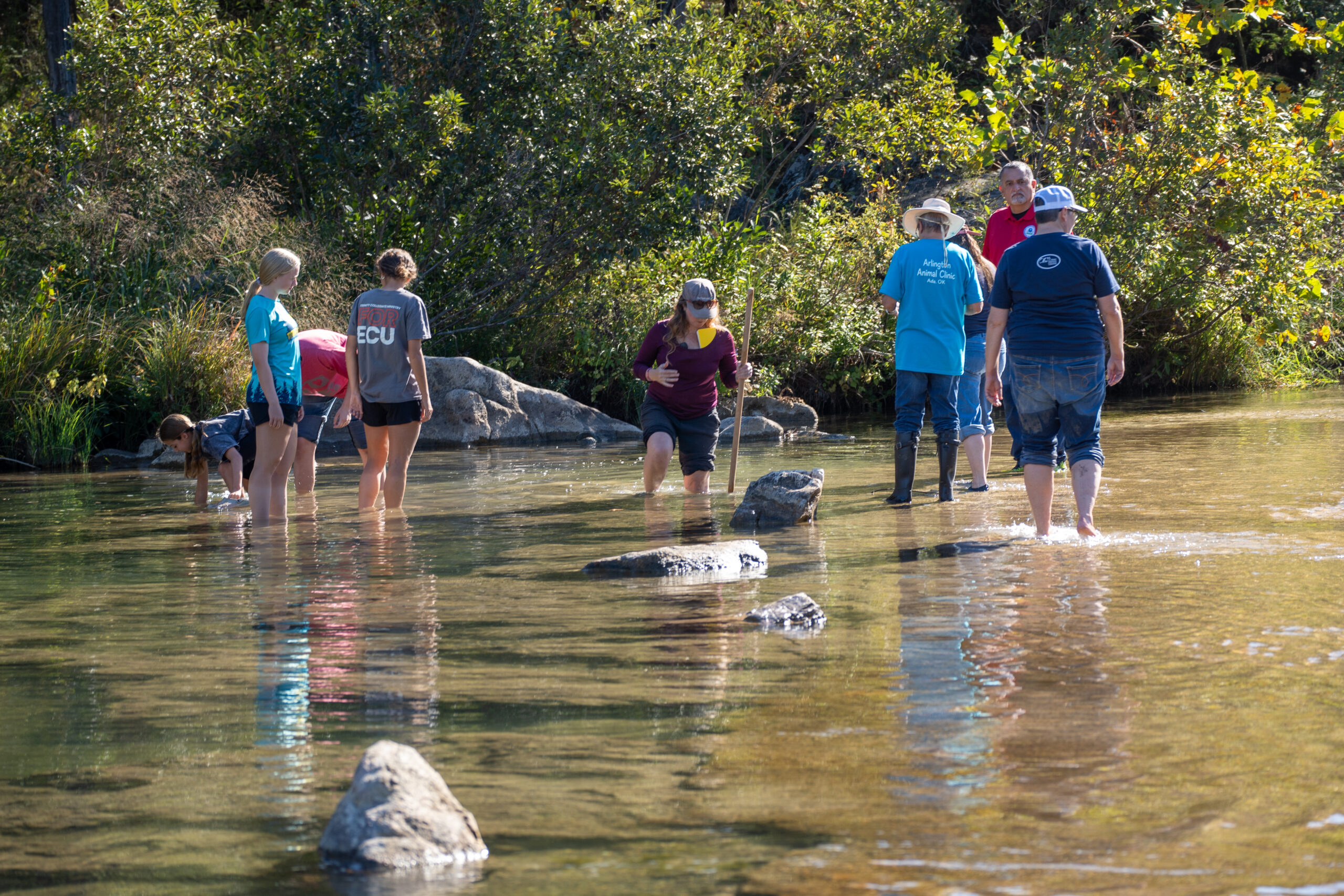
The rapids are a soft constant clatter
The trees are starting to remember it’s fall
All the plants are leaning into the water almost to hear its wise advice
Two damselflies landed on my finger, adopting me into their home
I remember I’m part of their world too
—Reece Roberson, ECU Student
By: Sunnie Dawn Baker
It was a beautiful Sunday afternoon. The sun was shining, and a hint of October briskness filled the air. It was a perfect day to be outside in nature and also perfect timing for the Oka Institute to host Oka Camp at the Blue River. Fifty people converged on this beautiful site for lunch, learning, and the nourishing of the soul. Dr. Christine Pappas, Director of the Water Resource Policy and Management Master’s program at East Central University, spearheaded this event as she is always trying to find ways to engage people with water instead of just taking it for granted as people can easily do.
Pappas dreamed of Oka Camp because she feels adults need to spend more time in nature. She contacted the Ada Jobs Foundation to see if they would be willing to co-sponsor this event and they agreed as a part of their partnership with the Oka Institute and also because of their commitment to the idea of the Blue Economy, where water technologies and sustainable practices can enhance the prosperity and quality of life within our communities. While there are occasionally outdoor encounter activities for adults through the college, Pappas wanted to go beyond offerings for the students, faculty, and staff of ECU and provide something to the broader community. Pappas says, “I think there are benefits to the individual for being in nature. It relaxes people and puts them in touch with the natural world around them. But for Oka Camp in particular, it reminds us of the source of our water and why we need to sustain our water resources.”
After the introductory remarks, Kimberly Elkin, from Watershed Life Consulting and The Watershed Movement, led a walk-and-talk. Elkin created a hands-on experience where she spoke for about ten minutes and then took children and adults into the water. After identifying the snails, mussels, and larvae, they returned them to the water. This allowed the participants to actively encounter the biodiversity of the Blue River while also doing so in a low-impact manner. Elkin says, “Oka Camp offers people the opportunity to sit next to the river and to engage in understanding our water resources as a vital component to our daily living.”
After Elkin’s talk about the ecology of the Blue River, Suzanne Woolley played the fiddle, giving people the chance to hear some beautiful music in nature as the melodies drifted along the water and wove their way among the leaves. Once everyone felt relaxed and inspired, Dr. Ken Hada, English Professor at ECU and author of twelve published books of poetry, shared some of his river-inspired poetry. Hada says, “Poetry allows us to enter the soul of a place. As a poet, I’m on the lookout for special places that inspire and restore me. The Blue River is one of those very special places. It is a place I care about very much—a place that must be protected.” After his reading, he led a writing workshop with the participants, encouraging them to write their own poetry. Some wrote their very first poem and seven different people shared what they had written.
The day focused on the ecology and inspiration of the Blue River, but it also emphasized connecting with others. The participants had time to sit and chat with one another, which was enjoyable, especially because the crowd was diverse, including many people who had never been to the Blue River before. The event included people from ECU and the Oka Institute, as well as from Kerr Lab and the broader community. Mason Martinez, a master’s student in the Water Resource Policy and Management program at ECU, happily attended with his friends and met new people. He says, “I got to jump in the river and swim around, but I also got to learn about the cultural significance of the river to the native tribes in the area. It made me have a greater appreciation because I got to experience the river for myself and enhance my understanding of how important it is to people.”
While the need to protect and conserve our water sources seems obvious, people can also easily take them for granted. That is one reason why events like this are significant to the community. Peggy Saunkeah, from Ada Jobs Foundation, says, “We must recognize that the Blue deserves our commitment to preservation, which is essential for enhancing community resilience and addressing climate change. This is not just about the present; it’s about the future.” People can express this respect and recognition for water sources in many different ways, through scientific study, advocacy, entrepreneurship, or the arts.

Written by
Ada Jobs
You may also interested in:
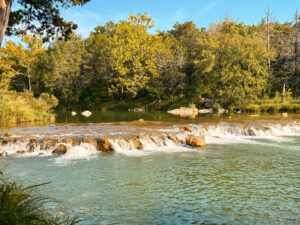
OKA' CAMP: A DAY OF WATER, WORDS, AND WISDOM
WATERSlumber, a desolate mind, trapped with thoughts of what is and what could have been. Awakened, but not by the beauty. A lust for power has gripped the heart of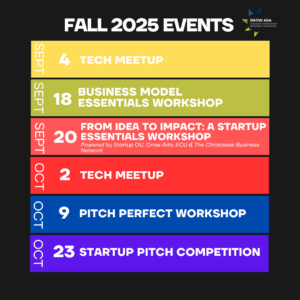
GET READY TO GROW: YOUR GUIDE TO FALL INNOVATION WITH GROW ADA
Have you ever wondered how a good idea becomes a great business? This fall, Grow Ada is rolling out a series of events designed to be your personal roadmap from
BUILDING FUTURES: WORK READY ADA CELEBRATES ITS FIRST YEAR
BY: CATHLENA SPENCER Just one year ago, Work Ready Ada, a new employment readiness program, was launched in partnership with Pontotoc Technology Center (PTC). The program, funded by Oklahoma Human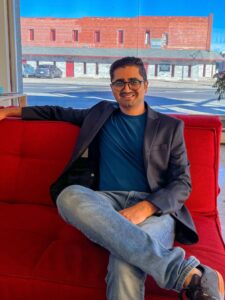
AI IN EDUCATION: A CONVERSATION WITH VINAYAK MITTY
BY: SUNNIE DAWN BAKER One of the areas in technology with the most potential for entrepreneurial growth is Artificial Intelligence (AI). AI is increasingly shaping every part of our lives,
FROM PARKS TO PRODUCTIVITY: THE ECONOMIC IMPACT OF ADA'S QUALITY-OF-LIFE INVESTMENTS
BY: SUNNIE DAWN BAKER Enhancing quality of life is one of the most crucial aspects of developing a local economy. In the 21st century, many people can live and work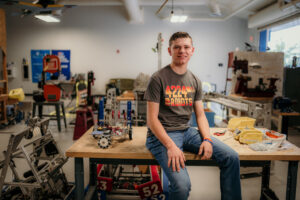
THINKING OUTSIDE THE BOX: ANDON RUSSELL, TECHNOLOGY, AND THE ENTREPRENEURIAL SPIRIT
BY: SUNNIE DAWN BAKER Andon Russell is always looking for his next entrepreneurial opportunity. He founded his own business, Russ-Tech Industries, before his freshman year of college and, despite beingMEET THE STAFF
DANIEL CASTANEDA Daniel Castaneda came to Grow Ada, formerly known as the Ada Jobs Foundation, four years ago. He holds a master’s degree in Regional and City Planning from the
KNOWLEDGE IS POWER: LOCAL EXPERT LEADS SMALL BUSINESS NETWORKING WORKSHOP
BY: SUNNIE DAWN BAKER Every month, Grow Ada hosts local Tech Meetups to help build and encourage our tech community. In some cases, there are speakers who give presentations on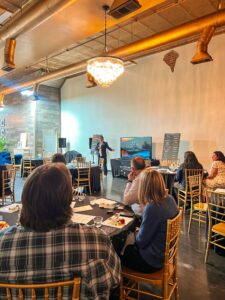
BUILDING ADA'S FUTURE: INDUSTRY, INNOVATION, AND ENTREPRENEURSHIP
BY: SUNNIE DAWN BAKER As the local economic development organization, Grow Ada, formerly known as the Ada Jobs Foundation, is well positioned to facilitate in our community’s continued success. While